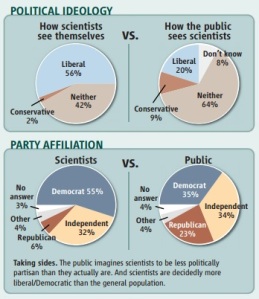Alex Berezow wrote an op-ed in USA Today defending the decision to defund the NSF’s political science programs aside from projects “promoting national security or the economic interests of the United States”. Berezow is also co-author of Science Left Behind, a book looking at anti-science tendencies on the left half of the political spectrum, which I blogged a bit about last November. And then the piece tapers off into something about scientists being too Democratic and they’re like a lobby and it just kind of becomes a generic cut the budget piece by the end. Needless to say, I’m not much more convinced by this op-ed than by the book or his interview with reason.
He starts by pointing out that political scientists are predictably outraged, but is confused why natural scientists are angry. He links to theoretical physicist Sean Carroll’s post on the funding cut and calls it an overreaction because he quotes “First they came”. Nazi overtones might be a bit much, but the analogy of continually chipping away at something seems valid. Berezow seems to think the fact that “relevant” political science could still be funded means a hard scientist shouldn’t ever worry about this. But a lot of hard science isn’t immediately practical. Carroll works in cosmology, which is basically abstract physics and abstract astronomy, so it seems entirely reasonable for him to worry about cuts to grants for research projects that won’t generate immediate economic benefit. We’ve already seen an attempt to go down the slippery slope with Lamar Smith’s proposed amendments to limit NSF funding in all fields to only projects relevant to economic or defense interests.
Berezow also claims that scientists act like too much of a partisan interest group since they only attack Republicans. While it’s true the Coburn amendment was approved by a bipartisan vote, that was part of a compromise to keep funding the government past sequestration. And Republicans have repeatedly offered similar amendments in the past, even when there weren’t such pressing budget concerns. It also seems ironic that despite two of Coburn’s amendments being incorporated into the bill, he still voted against it. Part of the logic behind the scientists are an interest group claim is how often they identify with Democrats. The survey does show that scientists are more Democratic and liberal than the general public. This may lead to a disconnect between scientists and the public on some issues, and it merits study, but there’s no clear mechanism explaining it. But Berezow also seems to be including social scientists in his definition of scientists. The survey everyone talks about is focused on natural scientists. While some social science fields are also filled with liberals, I believe that political science and economics have a stronger Republican/conservative presence.

Also, if politicians are going to go after interest groups, there are many with more votes to grab than a scientist bloc. In 1999, there were only about 3.5 million people with STEM degrees working in science and engineering fields. But if we’re talking about scientists as a interest group, we need to separate them from the engineers. Engineers are more likely to work in industry instead of in the public sector or academia than scientists, and also tend to be more evenly split along party and ideological lines. In 2011, about 35000 people graduated with doctorates in physical, life, and social sciences and engineering. Although this includes engineers, the fact that this only looks at people graduating with doctorates increases the odds that they will be doing basic research for the government or academia. Not all of those people are American citizens, though, and so they won’t vote. I don’t know the number for social sciences, but international students now make up almost half of all natural science and engineering grad students, so that already narrows the voter pool to like 25000 new group members a year (assuming nearly all social science PhDs are American citizens, for some reason). And not all these people will end up being funded by the government, either in a government agency or by public grants to universities. 27% of life science PhDs, 54% of physical science PhDs, and 71% of engineering PhDs went to work in industry in 2011. Factoring that in, a “government-dependent scientist” bloc would only grow by about 14000 votes a year. I think that is the rounding error of a decent get out the vote project.

In my view, Coburn’s criteria (that it be relevant to economic or defense interests) could be better used to DISQUALIFY a project from NSF funding, as it is likely to have access to private funding. The NSF should be funding the projects that have no immediate applicability, because it is just these kinds of projects that lead us to disruptive technologies such as the nuclear energy, semiconductors, and the laser.
And since disruptive technologies aren’t limited to “hard” science (ask Dr. John Nash), defunding PolSci is very shortsighted. It assumes a world where political science has reached its zenith, and that there are no disruptive ideas left in the world of human interaction. What a depressingly 19th century worldview to have.
A diplomat armed with a new negotiation technique, a better understanding of local political history or a new concept in how to manage conflicts is more valuable to a nations security than 10 new defense technologies, because it prevents us from having to use force to achieve our goals. The success of the cold war is an example of the power of new ideas, when viewed as an application of new game theories to the problems posed by nuclear weapons.
Had we not developed the new political tools (nuclear deterrence, mutually assured destruction, game theory, proxy conflict) in conjunction with the new military tools (fission bomb, fusion bomb, neutron bomb, ICBM, MIRV) The world may not have survived.